- info@ficci.org.bd
- |
- +880248814801, +880248814802
- Contact Us
- |
- Become a Member
- |
- |
- |
- |
- |
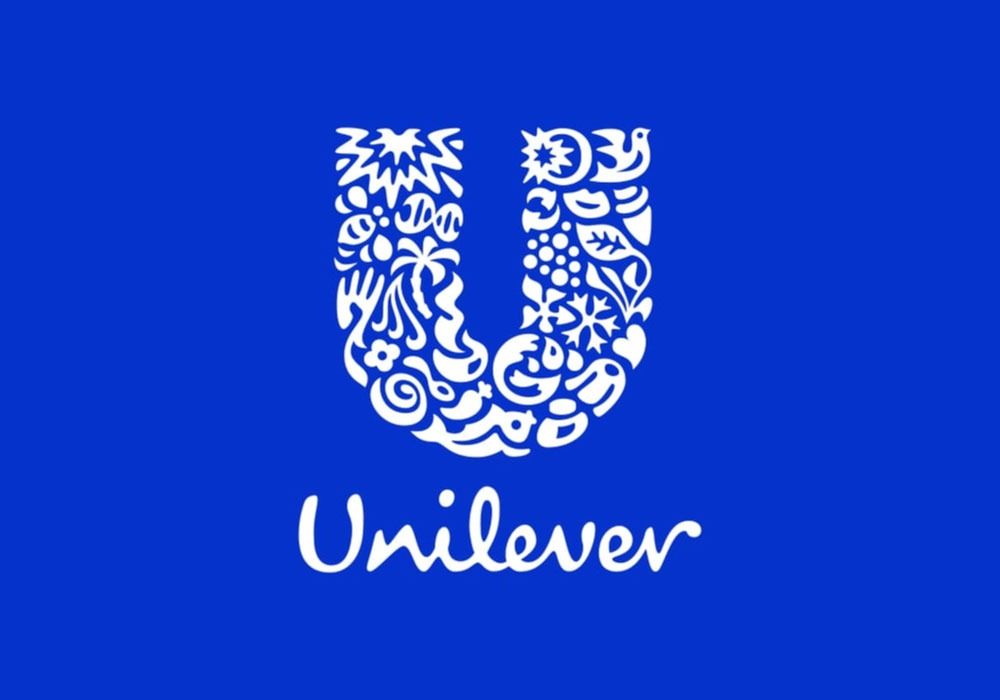
Unilever Bangladesh Limited (UBL) launched its second voluntary report, the Sustainability Blue Book 2024, at the event 'Progressing Sustainably: Together for Bangladesh' on 27 November 2024. The event brought together stakeholders, partners, and Unilever's sustainability champions to showcase its progress and vision for a sustainable future under its business strategy, the Growth Action Plan (GAP), focusing on four pillars: Climate, Nature, Plastic, and Livelihood. H.E. Sarah Cooke, British High Commissioner to Bangladesh, joined the event as the Chief Guest.

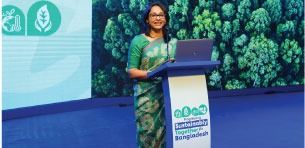 The event began with Shamima Akhter, Director - Corporate Affairs, Partnerships and Communications, UBL, delivering a keynote, charting Unilever's sustainability journey from the Unilever Sustainable Living Plan (2010) to the Unilever Compass (2020) and GAP (2023), which drives sustainable growth and innovation across its four key pillars. She also highlighted the evolving challenges of sustainability. She concluded with Unilever's vision to contribute to build a sustainable future for Bangladesh.
The event began with Shamima Akhter, Director - Corporate Affairs, Partnerships and Communications, UBL, delivering a keynote, charting Unilever's sustainability journey from the Unilever Sustainable Living Plan (2010) to the Unilever Compass (2020) and GAP (2023), which drives sustainable growth and innovation across its four key pillars. She also highlighted the evolving challenges of sustainability. She concluded with Unilever's vision to contribute to build a sustainable future for Bangladesh.
To delve deeper into UBL's sustainability initiatives under the four pillars of GAP, respective UBL teams presented 4 compelling case studies:
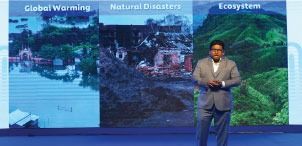
Presentation on Climate by Abdullah Mostofa, Country Safety, Health and Environment (SHE) Manager, UBL: Recognising climate change as a significant threat to people and the planet, Unilever aims for Net-Zero emissions across its value chain. By 2030, it targets a 100% reduction in operational emissions (Scope 1 & 2) from a 2015 baseline, a 42% reduction in Scope 3 energy and industrial emissions from a 2021 baseline, and a 30.3% reduction in Scope 3 Forest, Land, and Agriculture (FLAG)

Presentation on Nature by Dilruba Ahmed Choudhury, Country Procurement Lead and Nabil Imran Siddiquee, Head of Developments, UBL: Unilever is committed to protecting and regenerating nature both within and beyond its value chain. By sourcing responsibly and conserving critical natural resources like water, the organisation strives to leave a healthier planet for future generations. In Bangladesh, Unilever sources essential raw materials, such as palm oil, from NDPE-certified (No Deforestation, No Peat Conversion, No Exploitation) sources, despite the added cost. Additionally, the organisation continuously improves its product formulations to enhance consumer safety while reducing the need for natural resource extraction-for example, optimising Total Fatty Matter (TFM) in its products. This case study presentation highlighted Unilever's efforts in sustainable sourcing and resource-efficient production.
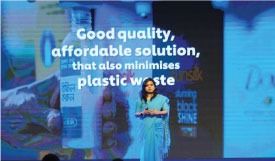 Presentation on Plastic by Sabera Haque, Category Head - Home & Hygiene, UBL: Unilever recognises the challenge of plastic pollution and leverages its innova- tion capabilities to develop scalable solutions. The organisation is committed to reducing virgin plastic use, optimising usage through design innovations, and introducing refill technology to revolutionise consumer purchases. Their aim is to end plastic pollution through reduction, circulation, and collaboration. In Bangladesh, Unilever is making significant strides by collecting and processing more plastic than they produce. This is achieved through partnerships with the informal
Presentation on Plastic by Sabera Haque, Category Head - Home & Hygiene, UBL: Unilever recognises the challenge of plastic pollution and leverages its innova- tion capabilities to develop scalable solutions. The organisation is committed to reducing virgin plastic use, optimising usage through design innovations, and introducing refill technology to revolutionise consumer purchases. Their aim is to end plastic pollution through reduction, circulation, and collaboration. In Bangladesh, Unilever is making significant strides by collecting and processing more plastic than they produce. This is achieved through partnerships with the informal
sector, value chain actors, multilateral donors, NGOs, and public sector entities like municipalities. While their approach aligns with their global commitment, it is tailored to the local context and ecosystem. They are also working on innovative solutions such as retail refill technology to further reduce plastic use. This case study presentation highlighted the Urefill initiative, which aims to protect the environment while adding consumer value, by driving behaviour change through innovation, inspiring retailers and consumers to join the fight for a plastic waste-free future for Bangladesh.
Presentation on Livelihood by Shabit Shafiullah, Customer Development (CD) Excellence Head: Inequality impacts income, health, human rights, and economic growth, and it also affects the resilience of corporate value chains. As a global consumer goods company, Unilever depends on a vast network of small retailers and partners whose success is directly tied to its own. Unilever Bangladesh is committed to improving the livelihoods of small retailers and value chain partners, recognising their critical role in its operations, by providing them with access to digital tools, financial inclusion services, and models to support entrepreneurship. This case study presentation focused on how through digitisation, Unilever Bangladesh is transforming the retail landscape of the country.
The event concluded with three insightful roundtable sessions, conducted in partnership with renowned think tanks and featuring industry leaders from 39 organisations:
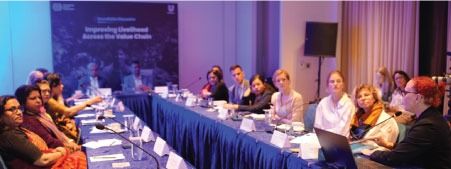
1. Improving Livelihoods Across the Value Chain: Organised by the International Labour Organisation (ILO), this session explored ways to enhance livelihoods across industries.
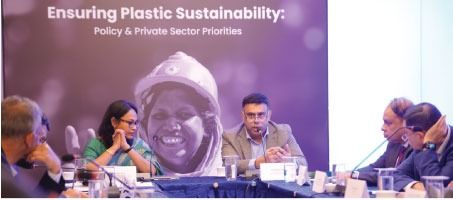
2. Achieving Plastic Circularity in Bangladesh: Moderated by the Policy Exchange of Bangladesh, this discussion centered on innovative strategies for managing plastic waste sustainably.
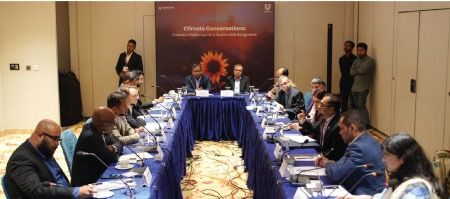
3. Climate Conversation: Collective Pathways for a Sustainable Bangladesh: Collaborated with Lightcastle Partners Limited, this roundtable focused on unified approaches to tackling climate challenges.
Over the years, UBL's journey towards sustainable growth has been marked by collaboration, resilience, and a shared purpose. Together with partners and stakeholders, the company has made significant strides in addressing sustainabil- ity challenges. The event's theme, "Progressing Sustainably: Together for Bangladesh," encapsulates this collective effort, celebrating impactful progress and reaffirming UBL's commitment to building a brighter, sustainable future for the nation.





